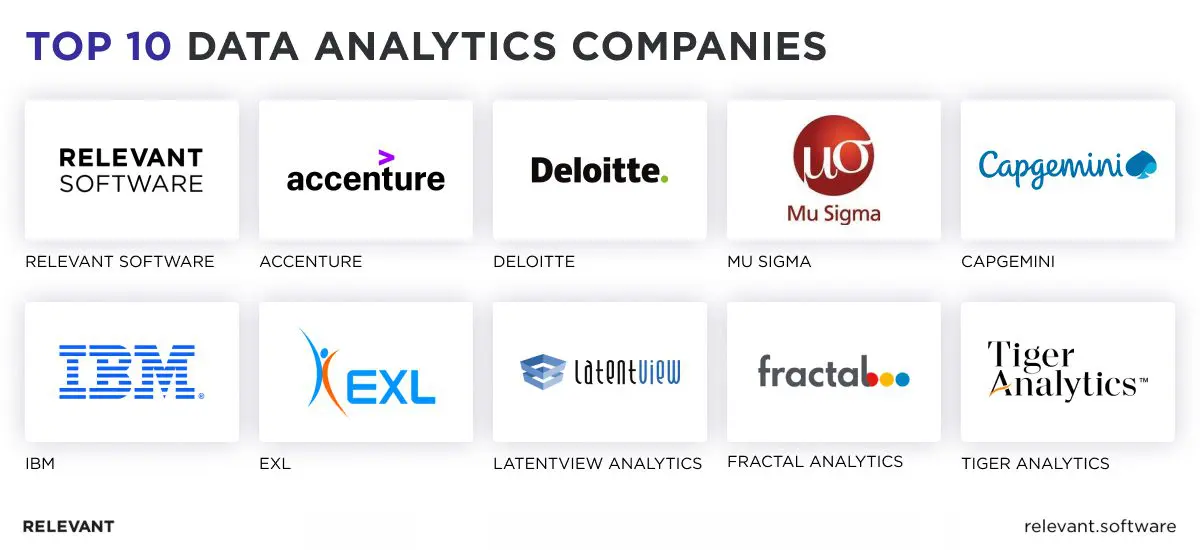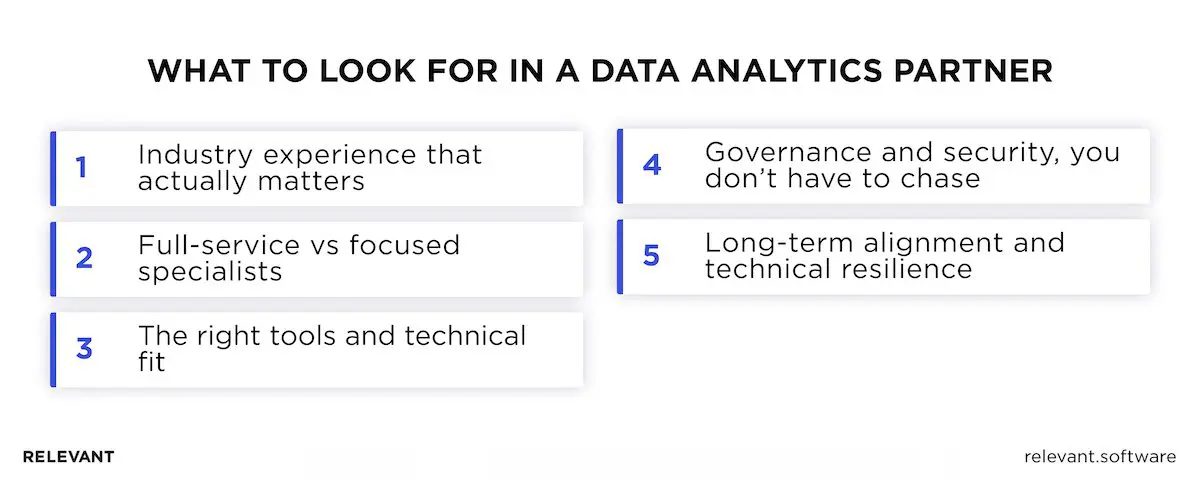Top 10 Data Analytics Companies in 2026: Detailed Guide

According to IDC’s Global DataSphere forecast, global data creation, replication, and consumption are expected to reach about 291 zettabytes by 2027, nearly double current volumes. Yet most organizations still fail to convert that flood of information into better business outcomes. Forrester reports that 73% of analytics projects fall short of expectations.
The problem isn’t data. The problem is direction.
from 25 countries outsourced software development to Relevant
We provide companies with senior tech talent and product development expertise to build world-class software.
Without a clear strategy and strong data management services underpinning it, even the best tools lose impact. Enterprises need more than dashboards; they need sharper insight, faster action, and experienced data analytics companies that know how to deliver both.
This guide highlights the top data analytics companies to watch in 2026. They are trusted data analytics firms that turn complexity into clarity and information into value.
Comparison table of top analytics companies
To start, we’ve prepared a comparison table that gives you a quick overview of the top 10 companies in data analytics. You can see the types of services they provide, the industries they focus on, their pricing models, core technologies, and how they typically work with clients. A detailed profile of each company follows in the next section.
| Company | Key services | Industry focus | Typical tech stack | Engagement type |
| Relevant Software | Custom analytics solutions, AI implementation, AI consulting, GenAI, Predictive analytics, and business intelligence | Fintech, healthcare, pharma, manufacturing, retail, energy | Python, SQL, Snowflake, Power BI, AWS | Consultancy and team extension |
| Accenture | Data strategy, cloud analytics, AI, managed reporting | Retail, telecom, public sector, banking | Azure, AWS, Google Cloud, Databricks, Tableau | Consulting and managed service |
| Deloitte | Analytics strategy, data governance, BI modernisation | Healthcare, government, and financial services | SAP BW, Snowflake, SAS, Power BI | Consulting and managed service |
| Mu Sigma | Decision analytics delivered as a service | CPG, insurance, pharma | R, Python, Hadoop, Spark | Managed service and dedicated teams |
| Capgemini | Data engineering, cloud migration, AI enablement | Manufacturing, energy, retail | Azure, GCP, SAP Data Intelligence, Qlik | Consulting and platform builds |
| IBM | Hybrid-cloud analytics, Watson AI, data fabric design | Banking, public sector, industrial products | Watson, Red Hat OpenShift, Db2, Cognos | Platform delivery and managed service |
| EXL | Analytics and operations outsourcing | Insurance, healthcare, utilities | SAS, AWS, Tableau, Python | Managed service and outsourcing |
| LatentView Analytics | Digital analytics, machine learning, and visualisation | Retail, media, technology | AWS, TensorFlow, Power BI, Snowflake | Consultancy and staff augmentation |
| Fractal Analytics | Customer analytics, AI solutions, forecasting | CPG, financial services, healthcare | AWS, Azure, TensorFlow, KNIME | Consulting and product frameworks |
| Tiger Analytics | Advanced analytics, data engineering, MLOps | Retail, e-commerce, logistics | AWS, Spark, Python, Tableau | Consulting and project delivery |
Why does choosing the right data analytics partner matter?
Your organisation sees an unexpected spike in operational issues, yet the cause sits buried in shipment logs, IoT sensor data, and support tickets. With data scattered across silos, no pattern comes into view. The right data analytics company brings these sources together, uncovers the root cause, and supplies clear answers. By working with the top data analytics companies, you gain a partner that connects every data point and turns confusion into insight.
Growing complexity across the stack
Five years ago, most companies used just a few internal databases. Now, they work with cloud data tools, mobile apps, IoT sensors, and data from partners and platforms in other industries. These data streams come in different formats, move at different speeds, and follow different rules. Leading data analytics software companies deliver proven integration frameworks (schema maps, privacy enforcement, tiered storage), built to handle complex data sets.
Talent gaps slow internal progress
Even if your team has business analysts, full-scale enterprise analytics demands cloud engineers, governance experts, data visualization specialists, and security leads. Creating that capability in-house takes time and incurs significant costs. A qualified data analytics consulting company provides the entire bench from day one. This support lets teams shift focus from infrastructure to decisive action. Among professional services firms, the best options know how to close both the technical and strategic gaps.
Business value comes from execution
The right data analytics services partner delivers results that impact the bottom line and meet specific business needs. Instead of manual report delays, teams access same-day dashboards. A merchandiser spots stockouts before the weekend. A finance leader uncovers fraud early. A service manager shifts headcount ahead of peak demand. This level of agility separates top performers from those who fall behind.
When you choose from the top data analytics companies, you are investing in better business outcomes. From retail to healthcare, the business models supported by modern analytics enable faster action, clearer insight, and stronger margins.
Top 10 data analytics companies in 2026: Detailed guide
Now we take a closer look at 10 data analytics companies that lead the field in 2026. These firms help enterprises modernize legacy systems, unify data, and apply AI to improve forecasting, operations, and customer insight. Each one has a proven record of delivering measurable business value.

Relevant Software
Overview: Relevant Software, a small data analytics company, focuses on custom platforms for midsize firms and in-house R&D groups. Senior engineers run each project, so feedback loops stay short, and every feature meets GDPR or HIPAA rules.
Scale & presence: 100+ experts across AI, ML, data science, and DevOps, hubs in Ukraine, Poland, and Spain; active projects across North America and the EU
Core services:
- Multi-cloud migration and governance
- AI implementation at scale
- Predictive models for operations and demand
- Data analytics consulting across verticals
Industries served: Healthcare, energy, finance, pharma, commercial real estate
Notable project: Relevant Software experts built an AI-driven CRM analytics platform for AstraZeneca, cutting manual work and enabling faster, compliant insights for Medical Affairs teams.
Why it’s chosen: Clients value Relevant Software for senior-led teams, predictable budgets, and rapid delivery cycles. These strengths make it a top data analytics outsourcing firm for regulated industries.
Accenture
Overview: Accenture, one of the biggest data analytics companies, supports board-level digital programs through its SynOps platform, which unites AI, automation, and analytics under one contract.
Scale & presence: about 790,000 professionals in offices from 120+ countries
Core services:
- Enterprise data modernization for legacy systems
- Predictive analytics tied to business KPIs
- Data governance and compliance frameworks
- AI deployment at scale
Industries served: Retail, financial services, public sector, manufacturing, healthcare
Notable project: A global retailer saw stock-out events drop by 30 percent once Accenture’s supply-chain model went live.
Why it’s chosen: Boards pick Accenture for reach, repeatable playbooks, and multi-vendor coordination across large geographies.
Deloitte
Overview: Deloitte, one of the best data analytics companies for regulated sectors, aligns analytics with strategy and compliance, ensuring audit-ready output from day one.
Scale & Presence: roughly 350,000 employees across 150 nations
Core Services:
- AI roadmaps
- Risk and compliance analytics
- Enterprise data-platform rollout
- Predictive KPIs
Industries served: Banking, energy, life sciences, government, technology
Notable project: A top-five pharma firm trimmed trial timelines after Deloitte deployed an AI patient-selection engine.
Why it’s chosen: Executives trust Deloitte to balance innovation with regulatory expectations, a hallmark of a best data analytics company.
Mu Sigma
Overview: Mu Sigma, a high-volume data analysis company, embeds small analytic models across many teams, driving rapid decision cycles.
Scale & presence: 10,000+ analysts in the US, UK, India, Singapore
Core services:
- Decision-support engines built for scale
- Broad analytics use case portfolios across departments
- Data science solutions focused on pricing, supply chains, and fraud risk
- Workflow automation tied to analytical triggers
Industries served: Retail, CPG, insurance, healthcare, tech
Notable project: Price-elasticity engines raised margin at a global CPG brand without customer churn.
Why it’s chosen: Firms needing hundreds of active use cases rely on Mu Sigma for depth and speed beyond single dashboards.
Capgemini
Overview: As a leading outsourcing firm for data analytics, Capgemini offers an Insights & Data unit that delivers end-to-end data programs with strict governance controls.
Scale & presence: More than 300 senior architects guide over 200 enterprise projects, with delivery hubs in Europe, North America, and Asia.
Core services:
- Lakehouse architecture for unified data storage and analysis
- Master data management to ensure consistency across systems
- AI microservices for modular, scalable intelligence
- Data quality scorecards to track and improve accuracy and trust
Industries served: Automotive, utilities, financial services, manufacturing, public sector
Notable project: A European utility recorded 22 percent fewer outage minutes after Capgemini launched a predictive-maintenance layer.
Why it’s chosen: Capgemini is a top choice for long-term outsourcing because it uses industry-specific templates and strict checks to ensure data quality.
IBM
Overview: IBM is a leading big data company for legacy systems. It connects mainframes with a hybrid cloud using Watson AI and a strong metadata framework.
Scale & presence: IBM fields a global workforce of roughly 280,000 and maintains analytics hubs across the Americas, Europe, and APAC.
Core services:
- Hybrid-cloud architecture to support flexible, scalable data platforms
- Cognitive search and NLP for unstructured data analysis
- AI model orchestration across enterprise systems
- Secure data operations to meet compliance and governance standards
Industries served: Banking, insurance, government, healthcare, telecom
Notable project: A multinational insurer cut claim cycles by forty hours and flagged 12 percent more fraud after IBM introduced a cognitive decision engine.
Why it’s chosen: Deep hardware roots plus modern AI skills make IBM a safe choice for high-risk, data-heavy environments.
EXL
Overview: EXL is a leading data analytics company focused on operations. It builds analytics right into everyday tasks like handling claims, patient care, and back-office work.
Scale & presence: EXL employs roughly 59,500 people worldwide and supports clients through more than 50 delivery centers.
Core services:
- Readmission-risk scoring for patient or client retention
- Fraud-risk heat maps to flag anomalies in claims or transactions
- Operational forecasts to guide staffing and resource allocation
- Customer value tiers to support personalized service strategies
Industries served: Insurance, healthcare, financial services, retail
Notable project: An NDA study logged an 18 percent readmission drop across five US hospitals after EXL models rolled out.
Why it’s chosen: EXL helps companies use data to work faster, avoid mistakes, and make better day-to-day decisions.
LatentView Analytics
Overview: LatentView offers fast revenue insight for marketing and price teams that lack heavy IT support.
Scale & presence: LatentView employs over 5,000 analytics professionals worldwide.
Core services:
- Customer segmentation
- Sales and demand forecasting
- Performance tracking dashboards
Industries served: eCommerce, consumer goods, financial services, media
Notable project: A global online marketplace increased its sales by 6% after LatentView improved its product recommendation system.
Why it’s chosen: Clients value LatentView for its quick onboarding, fast delivery of useful insights, and ability to run projects without depending on internal IT teams. The company suits business units that need answers fast, especially in sales and marketing.
Fractal Analytics
Overview: Fractal, as an AI plus behaviour-science data analytics company, pairs deep-learning models with behavioural cues, so users adopt insights in daily tasks.
Scale & presence: Fractal employs roughly 4,600 analytics professionals and operates 17 offices worldwide.
- AI-powered tools for business decision support
- Personalization systems for digital experiences
- Demand forecasting for individual products and categories
- Customer behavior analysis and segmentation
Industries served: Retail, insurance, healthcare, consumer products
Notable project: A global food group cut waste by fifteen percent after Fractal aligned SKU forecasts with local demand factors.
Why it’s chosen: Clients pick Fractal because its tools fit normal work routines, drive high adoption, and continue to deliver clear value long after launch.
Tiger Analytics
Overview: Tiger Analytics, as the best data analytics company for lean teams, promises small squads and quick ROI for firms that must move fast.
Scale & presence: About 3,000 specialists spread across hubs in North America, India, Europe, and Asia-Pacific.
Core services:
- Customer segmentation and behavior analysis
- Forecasting for demand, inventory, and revenue
- Machine learning systems for real-time decision-making
- Business intelligence dashboards and reporting tools
Industries served: Retail, telecom, transportation, healthcare
Notable project: A US telecom carrier saw a double-digit churn drop after Tiger’s uplift model flagged at-risk users (figures under NDA).
Why it’s chosen: Clients value Tiger Analytics for fast, senior-led teams, clear cost commitments, and measurable revenue gains within months.
What to look for in a data analytics partner
In this section, we break down what separates average vendors from high-performing data analytics solution companies. From industry specialization to tech stack depth, cloud solutions, and governance maturity, these are the factors that define a reliable partner in today’s complex analytics landscape.

1. Industry experience that actually matters
Creating a dashboard may seem straightforward. But few partners can deliver insights that help a supply chain director, clinical operations lead, or insurance claims analyst make better decisions. The difference lies in deep domain expertise.
A partner who’s worked across industries – healthcare, finance, retail – won’t need weeks to understand your data or goals. They’ve seen the patterns before. They know how raw data moves through your business process, what to flag, and what matters to your team. Whether it’s descriptive analytics for visibility or prescriptive analytics for action, they shape their tools to fit how your company actually runs.
Ask them:
- Have you worked in our sector with similar volumes and formats of raw data?
- Can you demonstrate understanding of our business process and regulatory context?
- What results have you helped clients in our industry achieve with your AI consulting services?
2. Full-service vs focused specialists
Some partners cover strategy, architecture, engineering, and optimization under one roof. Others focus on a specific layer, such as cloud infrastructure, BI tools, or model execution. Both models suit different needs; success depends on how well the firm aligns with your project scope.
For large initiatives that span cloud services, data pipelines, and multiple systems, full-service firms tend to coordinate efforts more effectively. If your team already supports parts of the stack, a specialized firm may deliver faster results with tighter control over cost and execution.
Think about:
- Where do you need the most help: strategy, engineering, or results?
- Do you prefer a single service provider or a focused team for one area?
3. The right tools and technical fit
There’s no one-size-fits-all tech stack anymore. A good partner will work with your setup, whether you run on AWS, Azure, or hybrid. They should handle structured and unstructured data from various sources, support cloud solutions, and adapt to different analytics types such as descriptive analytics or prescriptive analytics.
Also, look at how they support ongoing development: automation, version control, and testing are critical. These ensure performance and continuity after launch.
What to verify:
- Are they comfortable working across data warehouses, apps, or mobile platforms?
- Can they adapt to your software development company standards and environments?
- Do they support generative AI or other advanced models?
4. Governance and security, you don’t have to chase
Any analytics project that touches business intelligence, financial, or health data introduces risk. Strong partners don’t treat security as an afterthought. They embed it throughout the solution, starting from data preparation and data storage to access controls, encryption, and retention policies.
In sectors such as healthcare and finance, this is even more crucial. Your partner should understand compliance requirements and align their consulting services with your internal standards.
What to request:
- How access and data trust are maintained
- What security measures are in place across your global IT services
- Whether the solution supports audit trails and actionable insights
5. Long-term alignment and technical resilience
Strong analytics systems must grow alongside your business. A reliable partner avoids short-term fixes and builds systems ready for scale. They process higher data volumes, add new users with ease, and support tools such as mobile apps.
Top data analytics companies define internal logic, ensure system flexibility, and deliver solutions that withstand long-term demands. Their work supports ongoing improvement, enables business expansion, and facilitates seamless integration with future platforms.
Evaluate their long-term thinking:
- Can their architecture support new strategic insights over time?
- How well does the solution handle system expansion and competitive advantage?
- Is there a clear plan for knowledge transfer and business performance continuity?
Once key factors as domain experience, delivery model, technical fit, governance maturity, and long-term adaptability are clear, you’ll be in a strong position to evaluate partners effectively. A successful collaboration depends not only on a provider’s capabilities but on how well they align with your goals, systems, and pace of execution.
And now we proceed to the next step: how to select the right data analytics partner for your business based on your internal needs, maturity, and project scope.
How to select the right data analytics partner for your business
Picking the right data analytics company isn’t just about their qualifications. You also need to see if they match your team, tools, and goals. This section provides clear steps to follow before making a decision.
Define your analytics maturity & internal gaps
Begin with a clear picture of your current environment. A company that still builds its data foundation needs a different approach than one already active with AI across departments. Many partnerships fail when internal readiness does not align with what the vendor expects. A gap in technical capacity, leadership alignment, or governance can block progress. Set clear boundaries for ownership, timelines, and responsibilities early to avoid delays.
Review the basics:
- Are your systems stable enough to support outside collaboration?
- Do you have internal engineers or analysts who can manage part of the work?
- Can your business teams describe what they want from analytics?
- Is governance already in place or missing entirely?
The answers help define the type of partner you need. A full-service data analytics firm suits projects that require architecture, modeling, and visualization under one roof. A smaller data analytics consulting company may prove more effective when the scope is narrow or timelines are tight.
Clear visibility into your internal gaps gives your partner the context required to deliver measurable value.
Choose between strategic and tactical work
Not every project calls for a multi-year partnership. Some companies need help with a focused task: a dashboard, a data pipeline, a clean-up effort. Others need a long-term team that helps with architecture, tools, processes, and change management.
If your company addresses a specific short-term issue, a tactical firm may suit the need. For organizations planning to modernize their entire data infrastructure or foster a data-driven culture, it is more effective to partner with top data analytics companies that offer broad delivery capabilities.
Some questions to ask internally:
- Is the goal to solve a specific issue or to establish a long-term data program?
- Do we require strategic advisory support or a technical implementation team?
- Are we testing a partner, or starting a partnership?
Keep in mind that some of the best data analytics companies focus on one side or the other. A top-tier delivery firm may be built for strategic work and move more slowly on fast-turnaround requests. A niche player may ship code fast but lack the scope for enterprise change.
What to ask before you move forward
Beyond a strong proposal and a few case studies, deeper questions help determine whether a firm can operate effectively in your environment. The questions you raise during early discussions reflect how the project may unfold. You evaluate not only their technical ability but also their mindset, structure, and response to change.
Ask them:
- Have you solved problems like ours before, and what changed as a result?
- How do you work with internal teams, especially when knowledge transfer is key?
- If something breaks mid-project, how do you typically handle it?
- What does success look like in your model? How do you know when a project is working?
- What does your data governance process cover? How do you handle access and risk?
You’re also assessing communication style. Will they keep you informed? Can they shift plans if requirements evolve? Even the top big data analytics companies can fail if the partnership lacks clarity and trust.
Final thoughts: the future of data analytics partnerships
In the years ahead, data analytics and big data services will lean further into long-term, value-focused work. It won’t come down to who uses the most advanced platform. Success won’t depend on who has the most advanced platform, but on execution, how well your partner collaborates with your team, adapts to change, and delivers on promises.
The best data analytics companies don’t sell tools for the sake of it. They focus on results. They help organizations move faster, remove inefficiencies, and build trust in the data. For some, that means a full rebuild. Others need targeted support. In both cases, the right firm brings clarity and momentum where it matters most.
If you’re no longer satisfied with static reports and need data to drive real decisions, work with a company that understands the gap between activity and progress. Every data analytics solution company in this guide meets that standard.
Choose the one that fits your business. Then build on it.


Hand-selected developers to fit your needs at scale! Let’s build a first-class custom product together.

